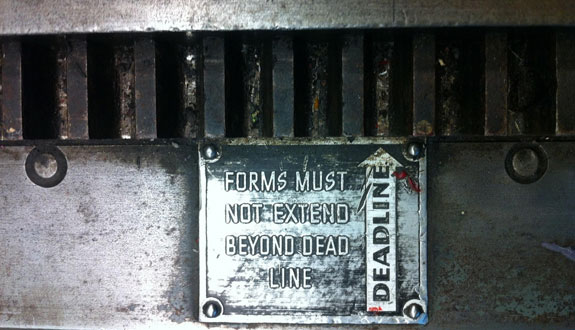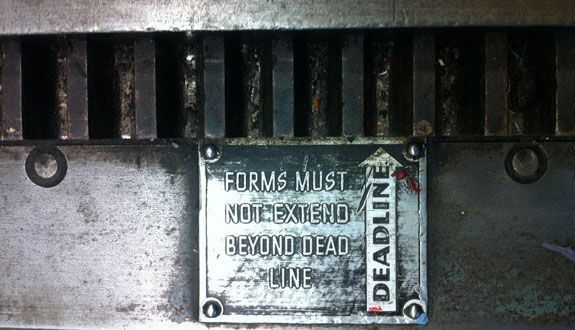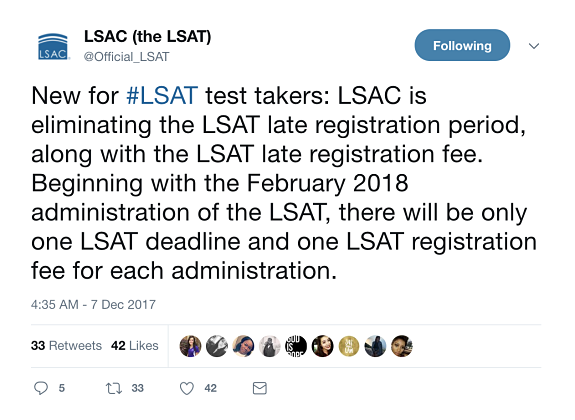Why Did LSAC Get Rid of the Late Registration Period?
- by
- Dec 11, 2017
- LSAT
- Reviewed by: Matt Riley


Last week, the unpredictable folks at the Law School Admission Council announced that, starting with the upcoming February 2018 LSAT, there would no longer be a late registration period.

What is the late registration period, you ask? Well, before this positively seismic change from LSAC, there used to be two deadlines to sign up for the LSAT. First, you had the regular deadline. It was usually about a month before the exam (for the Feb 2018 exam, the regular deadline is January 4th), and allowed you to take the LSAT for the low, low price of $180.
But then, for those law school hopefuls who don’t quite have their stuff together and/or are indifferent to the continued possession of money, there was a second “late registration” deadline. This deadline was a week after the regular deadline, and would allow those law school hopefuls, despite their dilatory ways, to sign up for the test for an additional fee of $100.
But that late registration is no more, according to LSAC. Instead, it’s taking away that extra week, and making the regular registration the only deadline. So now, dunderheaded law school candidates won’t have that extra week just in case they couldn’t remember to like, put an alert in their phone to sign up for the regular deadline.
But why is LSAC making this change? We don’t know for sure. But this change is a little bit curious, because pretty much every change to the exam that LSAC announced over the past year — whether that’s removing the cap on the number of times you can take the LSAT, increasing the number of times the LSAT will be administered in a year, or testing a digital version of the LSAT that could feasibly be given far more frequently and in far more locations — has been motivated by the apparent purpose of making the test more accessible to future JDs. After all, pretty much every law school that announces its decision to accept the GRE cites that exam’s ability attract a wide range of intellectually diverse students as reason for that decision. So if the LSAT wants to stymie this growing trend of law schools accepting the GRE, making their exam as accessible as possible is an important first step.
While docking off a week to let johnnies- and janies-come-lately sign up doesn’t make the LSAT significantly less accessible, it does go against LSAC’s recent trend of openness. So it’s a little bit strange. Let’s speculate, then, as to why LSAC might be making this change …
Some Boring Logistical Reason
Having that extra week of sign-ups probably makes the logistics of putting on the LSAT a little bit more difficult. The number of late enrollees is probably hard to predict and oscillates wildly from year to year. And this uncertainty probably means LSAC either has to scramble to find more testing centers and hire more proctors when they underestimate the number of late enrollees or have a bunch of un- or under-used testing facilities when they overestimate the number of late enrollees. Both of which cost money. And maybe that extra $100 they juice from those late-enrollees isn’t covering as much of the extra expenses as it used to, so LSAC just said the hell with it and decided to end this administrative headache.
Yeah, that makes sense. If I were a betting man, I’d put money on this being the reason. But I am not. Also, this reason is pretty boring. Let’s keep brainstorming …
LSAC Hates Money Now
Like Kyle, the pretentious and privileged second act love interest in Lady Bird, LSAC recently read A People’s History of the United States and started hand-rolling its own cigarettes and decided that it’s no longer excited to be a cog in the capitalist system. It’s now saying things like, “I don’t like money, so I’m trying to live by bartering alone.” It wants to save up for Burning Man 2018, so it still has to make some revenue from the regular registration, but has ended the late registration as a preliminary step away from capitalism and toward a utopian future where law school hopefuls exchanges handmade goods and services in exchange for the right to take the LSAT.
Ehh, probably not. Let’s keep going …
LSAC Decided That Too Many People Are Taking the LSAT Now
After years of declining LSAT takers and law school applicants, 2017 saw across the board increases in the LSAT takers and law school applicants. Mike Spivey’s recently posted data indicate that the number of December 2017 takers has increased 26.4% over last year. Plus, there’s been a 14.2% increase in applicants and a 17.1% increase in applications from this time last year.
This should be good news for LSAC. But maybe LSAC liked the more intimate, exclusive vibe fostered by fewer test takers. Like the nightclub that keeps a short guest list and a discriminatory door policy, the LSAT became the place to be. The only people who were taking the test were those who LSAC wanted to be there. The tastemakers. The influencers. The people who would actually go on to law school and a legal career.
Maybe LSAC doesn’t want those sheeple who just heard about the LSAT joining the party and ruining its carefully-curated experience. The people who show up late in the night (i.e., after the regular registration has passed), just because they say that the LSAT was popping on the ‘gram. So maybe the end of the late registration period is the equivalent of a velvet rope blocking access to those whom LSAC has deemed unworthy of admission.
I guess I still don’t buy that. If they let me take the test, it seems like they have an open-door policy …
Whatever the reason for this policy change, it shouldn’t really change how you approach the LSAT. You should still sign up as soon as possible — again, the deadline for the February 2018 exam is January 4, 11;59 pm EST. Signing up early will give you the advantage of getting to choose the best testing center and will help you avoid the dreaded waitlist.
Here’s a rundown on what we’ve heard about testing centers across the nation. In general, you should try to take the exam at a smaller university or law school, if possible. Avoid large universities, hotels, and, especially, convention centers — I heard reports that the convention center closest to me, the Long Beach Convention Center, didn’t begin the December exam until 11:00 am (two-and-a-half hours after the start time) and didn’t finish until 4:00 pm (the time at which most other LSAT takers were on their fourth or fifth cocktail).
Plus, signing up early will force you to commit to your study plan and give you the best chance to succeed on the actual test. If you’re a Gemini and suffer with indecisiveness, then you should at least register for an LSAT and take a subscribption-based LSAT course that you can start and stop whenever you need to (here’s an easy choice: try it for free!)
So don’t wait, and go sign up!
Search the Blog

Free LSAT Practice Account
Sign up for a free Blueprint LSAT account and get access to a free trial of the Self-Paced Course and a free practice LSAT with a detailed score report, mind-blowing analytics, and explanatory videos.
Learn More
Popular Posts
-
logic games Game Over: LSAC Says Farewell to Logic Games
-
General LSAT Advice How to Get a 180 on the LSAT
-
Entertainment Revisiting Elle's LSAT Journey from Legally Blonde








